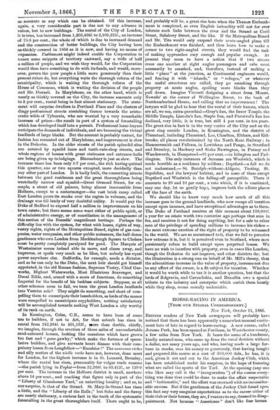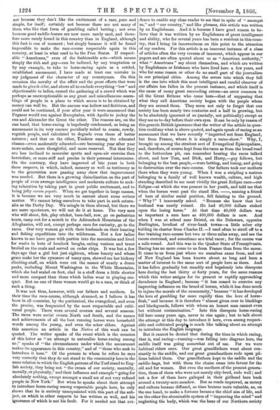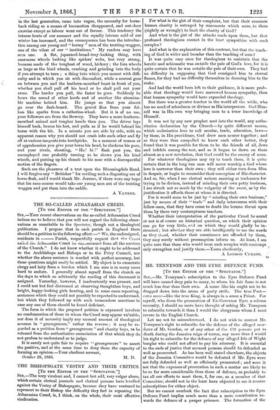HORSE-RACING IN AMERICA.
[FROM-OUR SPECIAL CORRESPONDENT.]
New York, October 11, 1866. Bnrnsu readers of New York newspapers will probably have noticed that there has been apparently a somewhat unusual excite- ment here of late in regard to horse-racing. A new course, called Jerome Park, has been opened at Fordham, in Westchester county, a few miles from New York. It bears the name of a handsome, kindly natured man, who came up from the rural districts without a dollar, not many years ago, and who, having made a large for- tune in stocks, uses his money so generously, that having bought and prepared this course at a cost of 300,000 dole., he has, it is said, given it out and out to the American Jockey -Club, which has- been established under his auspices, in the hope of fostering what are called the sports of the Turf. At the opening (any-one who likes may call it the "inauguration ") of the course every- thing was done that could be done to make the affair respectable and "fashionable," and the effort was crowned with no inconsider- able success. But if the gentlemen of the Jockey Club fund upon this fact any very sanguine expectations as to the career either of their club or their horses, they are, I venture to say, doomed to disap- pointment. Not because " Americans " don't like fine. horses
not because they don't like the excitement of a race, pure and simple, for itself; certainly not because there are not many of them who like that form of gambling called betting ; not even because good saddle-horses are now more rarely used, and there- fore more rarely found in this country than in England, although this fact is one of moment ; but simply because it will be found impossible to make the race-course respectable again in this country, at least in what used to be the Free States. If respect- able "Americans," even of the fashionable sets—which means simply the rich and gay—can be induced, by any temptation or by any example, to take to horse-racing again as a settled, established amusement, I have made at least one mistake in my judgment of the character of my countrymen. On this occasion the novelty of the affair and the great efforts that were made to give it &tat, and above all to exclude everything "low" and objectionable to ladies, caused the gathering of a crowd which was perhaps as unexceptionable as any great and miscellaneous assem- blage of people in a place to which access is to be obtained by money can well be. But the success was hollow and fictitious, and could not be continued, if year after year it were announced that Pegasus would run against Bucephalus, with Apollo to jockey the one and Alexander the Great the other. The reasons are, on the one hand, that horse-racing is hopelessly condemned, as being an amusement in its very essence peculiarly suited to coarse, rowdy, roguish people, and calculated to degrade even those of better natures ; and that on the other, Yankees among the educated classes—even moderately educated—are becoming year after year more sedate, more thoughtful, and more reserved. Not that they are less inclined to muscular sports and open-air exercise than heretofore, or more stiff and precise in their personal intercourse. On the contrary, they have improved of late years in both these respects, in which, indeed, memory as well as testimony as to the generation now passing away show that improvement was needed. But there is a growing disinclination on the part of people of even average intelligence and moderate culture to seek- ing relaxation by taking part in great public excitement, and to being jolly corant populo. When we get together in large masses, it is because we are very much in earnest about some serious matter. We cannot bring ourselves to take part in such saturn- alia as the Derby Day. We mingle in them abroad, but there we are mere spectators, we will not do it at home. The very men who will shoot, fish, play cricket, base-ball, row, go on pedestrian tours, camp out for a month in the Adirondack Mountains of the Alleghenies, will not, except perhaps once for curiosity, go to the races. Our very women go with their husbands on their hunting and fishing expeditions into the wilderness. Not a few ladies known to me have gone with parties into the mountains and lived for weeks in huts of hemlock boughs, eating venison and trout broiled on the coals and served on cedar chips. It was but a few days ago that a girl but just eighteen, whose beauty and whose grace make her the cynosure of many eyes, showed me her hickory climbing-staff, on which were cut the names of nearly a dozen peaks, including Mount Washington in the White Mountains, which she had scaled on foot, clad in a stuff dress a little shorter and more compact than those which ladies wear in playing cro- quet. But no one of these women would go to a race, or think of such a thing.
It was not thus, however, with our fathers and mothers. In their time the race-course, although shunned, as I believe it has been in all countries, by the puritanical, the evangelical, and even the precise, was frequented by the most respectable and culti- vated people. There were several courses and several seasons. The races were social events North and South, and the names and achievements of all the best running horses were household words among the young, and even the sober elders. Against this assertion an article in the Nation of this week can be quoted. The writer speaks of the event which is the occasion of this letter as "an attempt to naturalize horse-racing among us ;" speaks of "the circumstances under which the amusement makes its appearance in this country," and of "those who seek to introduce it here." Of the persons to whom he refers he says very correctly that they do not stand to the community here in the same relation in which the English patrons of the Turf stand to Eng- lish society, they being not "the cream of our society, mentally, morally, or physically," and their influence and example "going for absolutely nothing, except amongst a small set of not very refined people in New York." But when he speaks about their attempt to introduce horse-racing among respectable people here, he only shows that he is entirely unacquainted with this part of the sub- ject, on which in other respects he has written so well, and his ignorance of which is not his fault. For it needed not that evi- dence to enable any close reader to see that in spite of "amongst us," and "our country," and like phrases, this article was written by an Englishman. And it is because I have good reason to be- lieve that it was written by an Englishman of great intelligence and ability, who for several years has been a resident in this coun- try, that I bring its incorrectness on this point to the attention of my readers. For this article is an innocent instance of a clam of articles often the very reverse of innocent, which appear in our papers and are often quoted about us as "American authority," what " Americans " say about themselves, and which are written by Englishmen or Irishmen who have lived here a few years, and who for some reason or other do no small part of the journalism in our principal cities. Among the errors into which they fall is the one into which this most intelligent and candid observer of our affairs has fallen in the present instance, and which itself is the cause of many great succeeding errors—an error common to all the Great Britons who come here—that of supposing that what they call American society began with the people whom they see around them. They seem not only to forget that our society has been nearly two centuries and a half in growing, but to be absolutely ignorant of us (socially, not politically) except as they see us to-day before their own eyes. It can be only by reason of this generic British ignorance that the writer of the article in ques- tion could say what is above quoted, and again speak of racing as an amusement that we have recently "imported not from England, but from France, where it is simply a raree-show." Why, I, brought up among the straitest sect of Evangelical Episcopalians, and, therefore, of course kept from the races as from the broad road to the bottomless pit, can remember hearing the races talked about, and how Tom, and Dick, and Harry,—gay fellows, but belonging to the best people,—were betting, and losing, and going to destruction over the race-course. Our fathers took our mothers there when they were young. When I was a stripling a matron belonging to a family of well known wealth, culture, and high standing described to me most vividly the great Eclipse race—our Eclipse—at which she was present in her youth, and told me that when the horses went past the stand Mrs. —, naming a friend of hers of similar social position, fell fainting to the ground. " Why ?" I innocently asked. "Because she knew that her husband was nearly ruined. He had 40,000 dollars staked upon the losing horse." At that time 40,000 dollars was as important a sum here as 400,000 dollars is now. And when I was at school near Bristol, on the Delaware, opposite Burlington, loveliest of river-bank towns—a little sober city holding its charter from Charles 11.—I used often to stroll off to a fine training race-course but two or three miles away, and see the racers exercised, and sometimes se e trial races ; for the course was a mile round. And this was in the Quaker State of Pennsylvania. Racing has no more come to us from France than from the moon. It came to us from just where we ourselves came from, and out of New England has been known about as long and been a matter of interest to the same sort of people here as there. And it has fallen gradually but steadily and hopelessly into disrepute here during the last thirty or forty years, for the same reasona which this writer assigns for its present or rapidly approaching decadence in England ; because "it has ceased to exercise any improving influence on the breed of horses, while it has done much to injure the morals of the community," because "it has developed the love of gambling far more rapidly than the love of horse- flesh," and because it is therefore "almost given over to blacklegs and blackguards, fellows with whom an honest man cannot even bet without contamination." Into this disrepute horse-racing fell here many years ago, never to rise again ; but to talk about the attempt at this day to introduce it here, even among respect- able and cultivated peopl% is much like talking about an attempt to introduce the English language.
But it cannot be denied that during the time in which racing, that is, real racing—running—was falling into disgrace here, the saddle itself was going somewhat out of use. For we were habitual riders once. Our great grandfathers went about con- stantly in the saddle, and our great grandmothers rode upon pil- lions behind them. Our grandfathers kept to the saddle and the saddle-bags, but with them the chaise came into favour for the old and for women. But even the mothers of the present genera- tion, those of them who were not merely city-bred, rode well ; and not a few of them have galloped in their girlhood bare back around a twenty-acre meadow. But as roads improved, as money and culture became diffused, as time became more valuable, as, on the one hand, to make a fortune became the chief aim of life, and on the other the abominable system of "improving the mind" and neglecting t1;e body, which was the bane of our Northern society in the last generation, came into vogue, the necessity for horse- back riding as a means of locomotion disappeared, and out-door exercise except as labour went out of favour. This tendency the intense heats of our summer and the equally intense cold of our winter has increased, and the consequence has been the introduc- tion among our young and " horsey " men of the trotting-waggon, one of the vilest of our "institutions." My readers may have seen one. A flat, japanned-bread-tray-looking thing, with enormous wheels looking like spiders' webs, but very strong, because made of the toughest of wood, hickory ; the fore wheels as large as the hind wheels, crashing and grinding into the body if you attempt to turn ; a thing into which you mount with diffi- culty and in which you sit with discomfort, while a contest goes on between you and the leathern-mouthed beast in front of you, whether you shall pull off his head or he shall pull out your arms. The harder you pull, the faster he goes. Suddenly he hears the sound of other hoofs and of another like abomina- ble machine behind him. He jumps so that you almost go over the dash-board. The gravel flies from your fel- loes like sparks from a catherine-wheel. But it is of no use, your followers are from the Bowery. They have a more leathern- mouthed animal and tougher hands than you. The driver lays himself back, braces his feet, and pulls as if he would behead his horse with the bit. In a minute you are side by side, with no apparent reason why you should not crash into each other and fly off at various tangents into toothpicks. In a moment of reason or of apprehension you give your horse his head, he slackens his pace, and your rivals, shouting, " Ho ! hi !" flash past you, the unemployed one probably turning as he shows you his hind wheels, and putting up his thumb to his nose with a disrespectful motion of the fingers.
Such are the pleasures of a trot upon the Bloomingdale Road. I will forgive any " Britisher " for reviling such a disgusting use of horse-flesh, and I would thank Mr. Jerome, if there were any hope that his race-course would take our young men out of the trotting waggon and put them into the saddle.
A YANKEE.
































 Previous page
Previous page